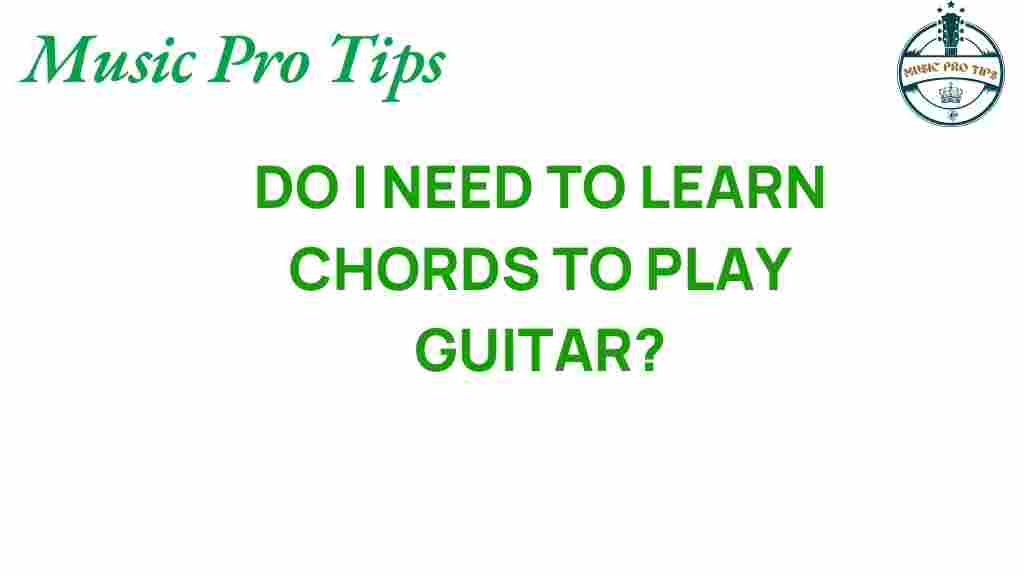Unlocking the Guitar: Is Chord Mastery Essential for Beginners?
Learning to play the guitar is a rewarding journey filled with creativity, expression, and musical joy. For beginners, one of the most fundamental aspects of this process is understanding guitar chords. Mastering these chords can open up a world of possibilities in music theory and enhance your overall playing technique. But is chord mastery truly essential for beginners? Let’s explore this question in-depth.
Understanding Guitar Chords
Before we dive into whether chord mastery is essential, let’s clarify what guitar chords are. A chord is a combination of three or more notes played simultaneously. In guitar playing, chords are usually formed by pressing down strings on the fretboard and strumming or picking them.
Chords are fundamental to many music genres, including rock, pop, blues, and folk. Here are some essential concepts related to guitar chords:
- Open Chords: These are chords that include one or more open strings (not pressed down). They are typically easier for beginners to learn.
- Barre Chords: These chords require the use of one finger to press down multiple strings across a fret. They can be more challenging but are essential for playing a wider variety of songs.
- Power Chords: Common in rock music, power chords consist of just two notes and are relatively simple to play.
Why Chord Mastery Matters for Beginners
For beginners, mastering chords is crucial for several reasons:
- Foundation of Playing: Chords are the building blocks of most songs. Understanding them allows beginners to accompany themselves while singing or playing along with others.
- Improved Music Theory Knowledge: Learning chords helps you understand music theory, including scales, intervals, and harmony, which are vital for more advanced playing.
- Enhanced Technique: Practicing chords helps beginners develop finger strength, dexterity, and coordination, which are essential skills for any guitarist.
- Variety of Genres: Chord mastery enables beginners to explore a wide range of musical genres, making their learning experience more enjoyable.
Step-by-Step Process: How to Master Guitar Chords
Now that we understand the importance of chord mastery, let’s go through a step-by-step process for beginners to effectively learn and practice guitar chords.
Step 1: Choosing the Right Guitar
Before starting your journey, make sure you have a guitar that is suitable for you. Consider the following:
- Acoustic vs. Electric: Acoustic guitars are great for beginners because they are portable and don’t require additional equipment. Electric guitars, however, can be easier to play for some due to their lighter strings.
- Size and Comfort: Ensure the guitar fits your body size and is comfortable to hold.
Step 2: Learning Basic Chords
Start with the most common open chords. Here are a few to get you started:
- C Major
- G Major
- D Major
- A Minor
- E Minor
Practice transitioning between these chords smoothly. Use a metronome to keep your timing consistent.
Step 3: Practicing Strumming Patterns
Once you are comfortable with basic chords, it’s time to work on strumming techniques. Strumming patterns can greatly enhance your playing style. Here are a few common patterns to practice:
- Down, Down, Up, Up, Down, Up
- Down, Down, Down, Down
- Down, Up, Down, Up
Start slow, and gradually increase your speed as you become more comfortable.
Step 4: Incorporating Fretting Techniques
Your fretting hand is crucial in chord playing. Here are some tips for effective fretting:
- Finger Placement: Make sure to press down on the strings close to the fret to get a clean sound.
- Use Your Fingertips: Use the tips of your fingers to avoid muting adjacent strings.
- Practice Finger Strength: Incorporate finger exercises to build strength and flexibility.
Step 5: Expanding Your Chord Vocabulary
Once you have mastered basic chords, start learning more complex chords such as:
- Seventh chords
- Suspended chords
- Minor chords
Explore chord charts and online resources to expand your knowledge.
Troubleshooting Common Issues
As you learn, you may encounter some common challenges. Here are some troubleshooting tips:
- Buzzing Strings: Make sure your fingers are pressing down hard enough and are positioned correctly.
- Difficulty Switching Chords: Practice transitioning slowly and focus on your finger placement.
- Pain in Fingers: It’s normal to feel some discomfort, but if pain persists, take breaks and check your technique.
Conclusion: The Journey of Chord Mastery
In conclusion, while chord mastery might seem daunting for beginners, it is an essential aspect of learning guitar. Mastering chords provides a solid foundation for your musical journey, enhances your technique and skills, and opens the door to understanding music theory. Remember, every guitarist started as a beginner, and with practice and perseverance, you will unlock the many possibilities that the guitar offers.
For additional resources on guitar chords and playing techniques, check out this comprehensive guide. Whether you’re strumming your first chord or refining your skills, remember that every small step counts on the path to becoming a proficient guitarist.
This article is in the category Theory and created by MusicProTips Team
